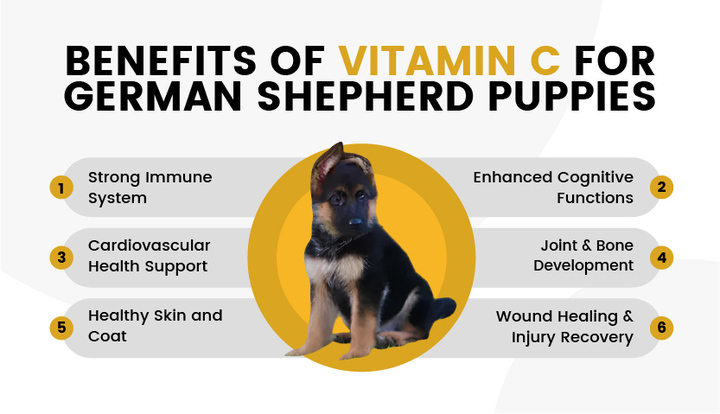
Vitamin C is a vital nutrient, well-known for its pivotal role in human health, but its importance in canine health often goes underappreciated. Unlike humans, most dogs can produce Vitamin C in their liver; however, in certain situations, such as high stress, illness, or rapid growth, a dog’s natural production may not suffice. This is particularly relevant for breeds like German Shepherds, which are known for their vigorous growth rates and unique health challenges.
For puppies, It is more than just a basic vitamin; it’s a vital component that supports their developing immune system, enhances collagen production for healthy joints and bones, and acts as a potent antioxidant protecting their cells from damage. As German Shepherd puppies are prone to conditions like hip dysplasia, the early introduction of Vitamin C can play a key role in preventing such issues by promoting healthy bone structure and joint health.
Here, we’ll discuss the Vitamin C for dogs benefits in ensuring the health and development from an early age.
SUMMARY
- Vitamin C supports the immune system by increasing white blood cells, notably neutrophils, which fight infections.
- How do Vitamin C’s antioxidant properties safeguard brain cells against oxidative stress and free radicals?
- Explore the function of Vitamin C in healthy cardiovascular function and accelerates wound healing.
Benefits of Vitamin C for German Shepherd Puppies

1. Strengthening the Immune System
German Shepherd puppies are notorious for their high energy levels, constant curiosity, and tendency to explore everything in their environment. While this is great for their development, it exposes them to various bacteria, viruses, and pathogens, which can test their immature immune systems.
- It plays a key role in their immune response. It stimulates the production of white blood cells, particularly neutrophils, the body’s first line of defense against infections.
- Increases the activity of phagocytes, cells that engulf and destroy harmful bacteria.
- This vitamin is especially beneficial during times of stress, such as after vaccinations, during teething, or while adjusting to a new home, as the body’s immune defenses tend to weaken during these periods.
Studies have shown that dogs experiencing stress have lower levels of vitamin C in their blood. For German Shepherd puppies, whose active nature can sometimes lead to minor injuries or diseases, adequate vitamin intake significantly affects their immune health.
CALL Michael and Jeannette Today!
Your Loyal German Shepherd is Just a Call Away – Purebred and Ready for Your Family!

2. Aiding in Joint and Bone Development
German Shepherds are a large breed known for their predisposition to orthopedic issues, particularly hip and elbow dysplasia. Joint health should be a priority from a young age, especially as puppies experience rapid growth. Vitamin C is crucial in this area due to its role in collagen synthesis in both animals and humans.
Vitamin C helps the body produce collagen and maintains the integrity of connective tissues in bones, cartilage, tendons, and ligaments. In German Shepherd puppies, this can aid in developing strong, flexible joints that can better withstand the physical demands of their active lifestyle.
Research suggests it has anti-inflammatory properties that prevent and manage early joint inflammation. While vitamin C is not a cure for joint disorders, supplementing a growing puppy’s diet with vitamin C may help reduce the severity of symptoms and contribute to healthier skeletal development.
3. Enhancing Cognitive Function
Brain development is just as important as physical growth during the early stages of a German Shepherd’s life. German Shepherds are highly intelligent and trainable, but their cognitive abilities depend on the right nutrition to develop fully. Vitamin C, with its antioxidant properties, protects brain cells from oxidative stress and free radicals.
Oxidative stress can damage neurons, leading to reduced cognitive function and memory. Vitamin C neutralizes free radicals that develop your puppy’s brain properly.
Adequate vitamin C levels have been linked to improved learning abilities. During puppyhood, when training is most effective, providing optimal nutrition with vitamin C supports better retention and faster response to training commands.
4. Supporting Healthy Skin and Coat
German Shepherds’ double coat, with a thick, soft undercoat and a coarser outer layer, requires more than regular grooming. It starts with good nutrition. It is essential for skin health. The role of vitamin C in collagen production is to maintain skin elasticity and integrity.
In puppies, skin growth is rapid, and without adequate collagen support, they may experience skin issues such as dryness, flakiness, or irritation. It keeps their skin supple and promotes faster healing when they sustain minor cuts or scratches during play.
The antioxidant properties of vitamin C also protect the skin from environmental damage caused by UV rays and pollutants. A vitamin C rich diet can ensure their coat remains shiny, vibrant, and resistant to shedding more than normal.
5. Supporting Cardiovascular Health
German Shepherds are a large and active breed that rely on a strong cardiovascular system to fuel their energy and maintain health.
- Vitamin C plays an indirect but significant role in supporting heart health.
- It is vital for forming and maintaining blood vessels, particularly the walls of arteries.
- The collagen production provides structural integrity to blood vessels, helping them remain flexible and resilient.
- Reduce oxidative stress in the circulatory system, minimizing damage to heart tissues caused by free radicals.
This is particularly relevant for active breeds like German Shepherds, who are naturally prone to generating more oxidative by-products due to their high energy levels.
For German Shepherd puppies, whose cardiovascular system is still developing, vitamin C ensures that their blood vessels grow properly. Allowing them to handle increased physical activity as they mature.
6. Boosting Wound Healing and Recovery from Injuries
German Shepherd puppies are playful and adventurous. This makes them prone to minor cuts, scrapes, or injuries as they explore their environment. Vitamin C proves to be an invaluable ally in speeding up the healing process.
- It enhances wound healing by promoting collagen synthesis, which is crucial for the repair of damaged skin, tendons, and ligaments.
- Collagen provides the scaffold for new tissue to form, helping wounds close faster and more efficiently.
- Boosts the activity of fibroblasts, the cells that help build and repair connective tissues, ensuring that wounds heal properly without leaving behind weak scar tissue.
Note: The role of vitamin C in immune system support also contributes to faster recovery.
What are the Signs of Vitamin C Deficiency in GSD Puppies?
While vitamin C deficiency is relatively rare in dogs due to their ability to synthesize it, certain conditions or dietary restrictions can lead to lower levels.
Symptoms of vitamin C deficiency in puppies may include:
- Weakness or lethargy
- Poor wound healing
- Skin issues, such as dryness or flakiness
- Increased susceptibility to infections
If you notice these signs in your German Shepherd puppy, it may be time to assess their diet and consult your veterinarian.
Detecting vitamin C deficiency early is crucial for your puppy’s long-term health. If left unaddressed, deficiencies can lead to more severe health issues and hinder development.
Whole Food Sources of Vitamin C for German Shepherd Puppy
Some dog-safe fruits and vegetables high in vitamin C include:
- Blueberries: A great antioxidant-rich s
- Carrots: Crunchy and healthy, these are perfect for training treats.
- Sweet Potatoes: A nutritious carbohydrate that’s also high in vitamins.
- Pumpkin: Excellent for digestion and a good source of vitamin C.
- Bell Peppers: Red bell peppers are especially rich in nutrients.
When introducing new foods, do so gradually to avoid gastrointestinal upset. Always ensure that fruits and vegetables are appropriately prepared; remove any seeds or pits and cut them into manageable pieces.
CALL Michael and Jeannette Today!
Ready for Your Home – Trained, Loyal Adult German Shepherds for Sale!

Some Vitamin C Supplements for German Shepherd Dogs
Here are some German Shepherd supplements such as:
1. Ascorbic Acid
Ascorbic acid is the most common and widely recognized form of Vitamin C. It is often available in both powder and tablet form, making it versatile for pet owners.
The powder can easily be mixed into your dog’s food, ensuring they receive their daily dose without fuss. Tablets can be given directly or crushed for smaller dogs, providing a straightforward way to boost your dog’s Vitamin C intake.
2. Vitamin C Chewables
These vitamins are specially formulated for dogs and come in delicious flavors that appeal to canine taste buds. These tasty tablets make it easier for your German Shepherd to consume their Vitamin C without the hassle of pills or powders.
Chewables can be an enjoyable treat, ensuring your dog looks forward to their supplementation.
3. Multivitamins with Vitamin C
Multivitamins designed for dogs often contain a comprehensive range of essential vitamins and minerals, including Vitamin C. These supplements aim to support health and well-being, promoting strong immune function, healthy skin, and proper growth.
4. Liposomal Vitamin C
Liposomal is a unique formulation that encases Vitamin C in tiny lipid bubbles called liposomes, which enhance absorption and bioavailability.
This form is typically available in liquid form and is generally easy to give to pets. The liposomal delivery system can help ensure that more Vitamin C reaches your dog’s bloodstream, maximizing its benefits.
5. Vitamin C Enriched Dog Treats
Some dog treats are specially formulated to include added Vitamin C, providing a tasty way to boost your dog’s intake of this essential nutrient.
These treats can be a fun addition to your dog’s diet and make supplementing their nutrition enjoyable. Look for high-quality treats that use natural ingredients and offer additional health benefits.
8. Probiotic Supplements with Vitamin C
Certain probiotic supplements are enriched with Vitamin C, promoting gut health while providing immune support. These products can help balance your dog’s digestive system.
By combining probiotics with Vitamin C, these supplements can support not only your dog’s gut health but also their immune function, making them a great option for maintaining a healthy dog.
NOTE: Always consult with your veterinarian before introducing any new supplements to your German Shepherd’s diet, as they can recommend the best options based on your dog’s specific health needs. It is best to fulfill your pet’s nutrient needs with raw food rather than any other source.
Recommended Dosage of Vitamin C for Puppies
While German Shepherds can produce vitamin C independently, supplementation can provide additional benefits, particularly for puppies undergoing stress, illness, or those with compromised immune systems.
Dogs’ recommended dietary allowance (RDA) for vitamin C varies based on:
- Size
- Age
- Health status
A general guideline for puppies is about 18 mg of vitamin C per day, depending on their weight and health. It is crucial to consult a veterinarian to determine the appropriate dosage tailored to your puppy’s needs.
FAQs
Can too much Vitamin C harm my German Shepherd puppy?
Excessive Vitamin C, a water-soluble vitamin, can cause digestive upset, such as diarrhea. Any excess is typically flushed out through urine, but it’s still important to consult with a vet for proper dosing.
At what age should I start giving my German Shepherd puppy Vitamin C?
Under your veterinarian’s guidance, You can supplement Vitamin C as early as the weaning stage (around 6–8 weeks old). It’s particularly beneficial as puppies grow and their immune systems and joints develop.
Can German Shepherd puppies be allergic to Vitamin C?
German Shepherd puppies are not typically allergic to Vitamin C since it’s a naturally occurring nutrient in their bodies. However, in rare cases, some may have sensitivities to certain forms of supplements or other ingredients in those supplements, like additives or preservatives.
The Bottom Line
Consult a veterinarian before changing your puppy’s diet or introducing supplements.
They can assess your puppy’s health, dietary habits, and specific needs based on age, weight, and activity level. A professional will provide tailored advice on safely incorporating vitamin C into your puppy’s diet.





